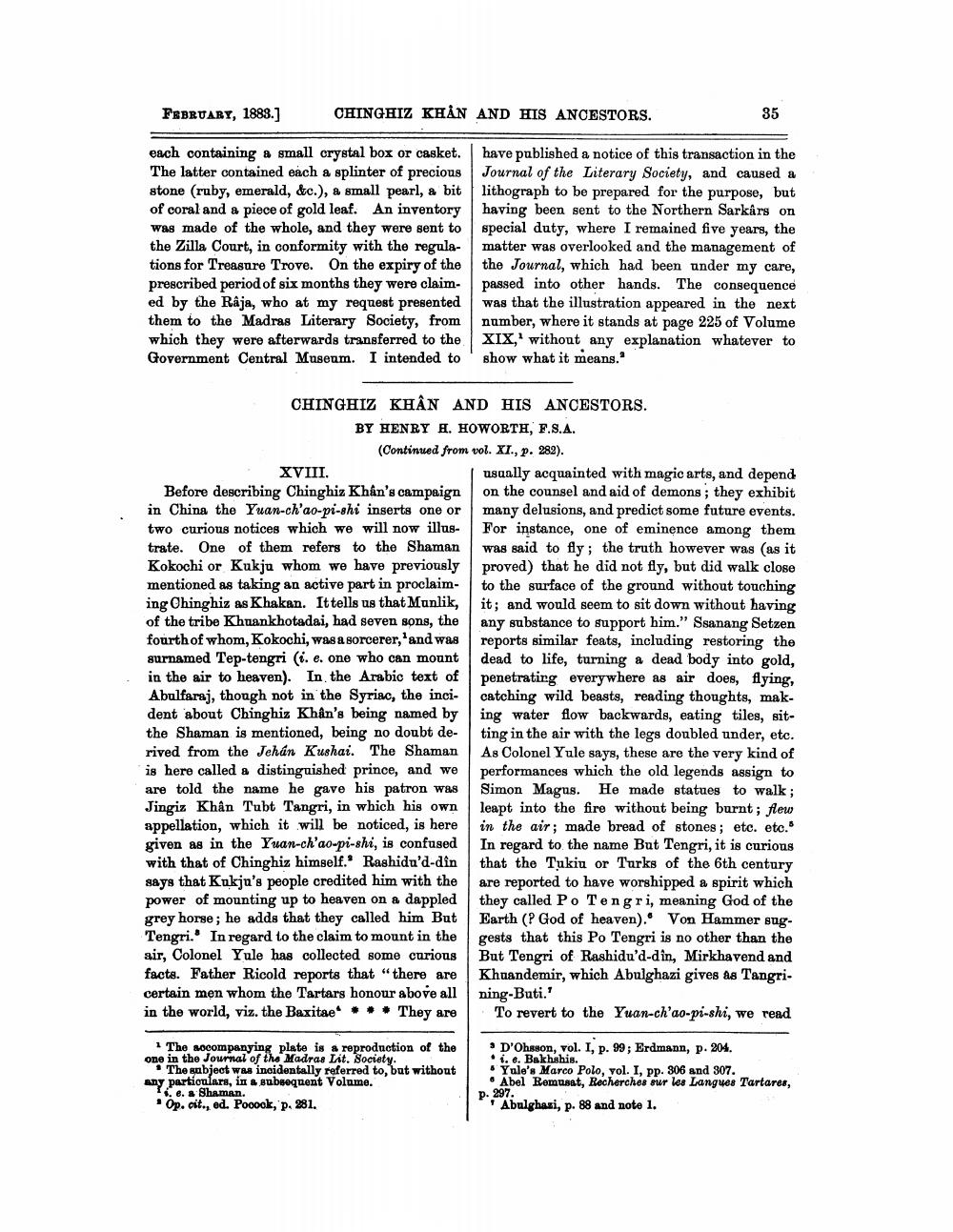________________
CHINGHIZ KHAN AND HIS ANCESTORS.
FEBRUARY, 1883.]
each containing a small crystal box or casket. The latter contained each a splinter of precious stone (ruby, emerald, &c.), a small pearl, a bit of coral and a piece of gold leaf. An inventory was made of the whole, and they were sent to the Zilla Court, in conformity with the regulations for Treasure Trove. On the expiry of the prescribed period of six months they were claimed by the Raja, who at my request presented them to the Madras Literary Society, from which they were afterwards transferred to the Government Central Museum. I intended to
CHINGHIZ KHAN AND HIS ANCESTORS. BY HENRY H. HOWORTH, F.S.A. (Continued from vol. XI., p. 282).
XVIII.
Before describing Chinghiz Khan's campaign in China the Yuan-ch'ao-pi-shi inserts one or two curious notices which we will now illustrate. One of them refers to the Shaman Kokochi or Kukju whom we have previously mentioned as taking an active part in proclaiming Chinghiz as Khakan. It tells us that Munlik, of the tribe Khuankhotadai, had seven sons, the fourth of whom, Kokochi, was a sorcerer,1and was surnamed Tep-tengri (i. e. one who can mount in the air to heaven). In the Arabic text of Abulfaraj, though not in the Syriac, the incident about Chinghiz Khân's being named by the Shaman is mentioned, being no doubt derived from the Jehan Kushai. The Shaman is here called a distinguished prince, and we are told the name he gave his patron was Jingiz Khân Tubt Tangri, in which his own appellation, which it will be noticed, is here given as in the Yuan-ch'ao-pi-shi, is confused with that of Chinghiz himself. Rashidu'd-din says that Kukju's people credited him with the power of mounting up to heaven on a dappled grey horse; he adds that they called him But Tengri. In regard to the claim to mount in the air, Colonel Yule has collected some curious facts. Father Ricold reports that "there are certain men whom the Tartars honour above all in the world, viz. the Baxitae✶✶ ✶ They are
1 The accompanying plate is a reproduction of the one in the Journal of the Madras Lit. Society.
The subject was incidentally referred to, but without any particulars, in a subsequent Volume.
4. e. a Shaman.
Op. cit., ed. Pocock, p. 281.
35
have published a notice of this transaction in the Journal of the Literary Society, and caused a lithograph to be prepared for the purpose, but having been sent to the Northern Sarkârs on special duty, where I remained five years, the matter was overlooked and the management of the Journal, which had been under my care, passed into other hands. The consequence was that the illustration appeared in the next number, where it stands at page 225 of Volume XIX,' without any explanation whatever to show what it means."
usually acquainted with magic arts, and depend on the counsel and aid of demons; they exhibit many delusions, and predict some future events. For instance, one of eminence among them was said to fly; the truth however was (as it proved) that he did not fly, but did walk close to the surface of the ground without touching it; and would seem to sit down without having any substance to support him." Ssanang Setzen reports similar feats, including restoring the dead to life, turning a dead body into gold, penetrating everywhere as air does, flying, catching wild beasts, reading thoughts, making water flow backwards, eating tiles, sitting in the air with the legs doubled under, etc. As Colonel Yule says, these are the very kind of performances which the old legends assign to Simon Magus. He made statues to walk; leapt into the fire without being burnt; flew in the air; made bread of stones; etc. etc." In regard to the name But Tengri, it is curious that the Tukiu or Turks of the 6th century are reported to have worshipped a spirit which they called Po Tengri, meaning God of the Earth (? God of heaven). Von Hammer suggests that this Po Tengri is no other than the But Tengri of Rashidu'd-din, Mirkhavend and Khuandemir, which Abulghazi gives as Tangrining-Buti.'
To revert to the Yuan-ch'ao-pi-shi, we read
D'Ohsson, vol. I, p. 99; Erdmann, p. 204. i. e. Bakhshis.
Yule's Marco Polo, vol. I, pp. 306 and 307.
Abel Remusat, Recherches sur les Langues Tartares,
p. 297.
'Abulghazi, p. 88 and note 1.




